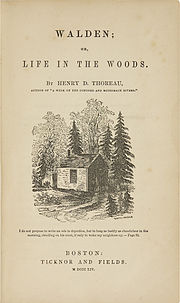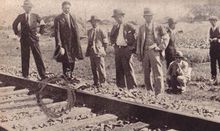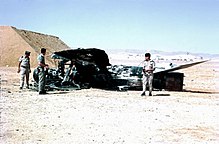Anarcho-primitivism is a political ideology that advocates a return to non-"civilized" ways of life through deindustrialization, abolition of the division of labor or specialization and abandonment of large-scale organization technologies. Anarcho-primitivists critique the origins and progress of the Industrial Revolution and industrial society. According to anarcho-primitivism, the shift from hunter-gatherer to agricultural subsistence during the Neolithic Revolution gave rise to coercion, social alienation and social stratification.
Many classical anarchists reject the critique of civilization while some such as Wolfi Landstreicher endorse the critique without considering themselves anarcho-primitivists. Anarcho-primitivists are often distinguished by their focus on the praxis of achieving a feral state of being through "rewilding".
History
Origins
In the United States, anarchism started to have an ecological view mainly in the writings of Henry David Thoreau. In his book Walden, he advocates simple living and self-sufficiency among natural surroundings in resistance to the advancement of industrial civilization. "Many have seen in Thoreau one of the precursors of ecologism and anarcho-primitivism represented today by John Zerzan. For George Woodcock, this attitude can also be motivated by the idea of resistance to progress and the rejection of the increasing materialism that characterized North American society in the mid-19th century." Zerzan himself included the text "Excursions" (1863) by Thoreau in his edited compilation of anti-civilization writings called Against Civilization: Readings and Reflections from 1999.
In the late 19th century, anarchist naturism appeared as the union of anarchist and naturist philosophies. It mainly was important within individualist anarchist circles in Spain, France and Portugal. Important influences in it were Henry David Thoreau, Leo Tolstoy and Elisee Reclus. Anarcho-naturism advocated vegetarianism, free love, nudism and an ecological world view within anarchist groups and outside them.
Anarcho-naturism promoted an ecological worldview, small ecovillages, and most prominently nudism as a way to avoid the artificiality of the industrial mass society of modernity. Naturist individualist anarchists saw the individual in his biological, physical and psychological aspects and avoided and tried to eliminate social determinations. Their ideas were important in individualist anarchist circles in France but also in Spain where Federico Urales (pseudonym of Joan Montseny), promotes the ideas of Gravelle and Zisly in La Revista Blanca (1898–1905).
This tendency was strong enough as to call the attention of the CNT–FAI in Spain. Daniel Guérin, in Anarchism: From Theory to Practice, reports how "Spanish anarcho-syndicalism had long been concerned to safeguard the autonomy of what it called "affinity groups". There were many adepts of naturism and vegetarianism among its members, especially among the poor peasants of the south. Both these ways of living were considered suitable for the transformation of the human being in preparation for a stateless society. At the Zaragoza congress, the members did not forget to consider the fate of groups of naturists and nudists, "unsuited to industrialization." As these groups would be unable to supply all their own needs, the Congress anticipated that their delegates to the meetings of the Confederation of communes would be able to negotiate special economic agreements with the other agricultural and industrial communes. On the eve of a vast, bloody, social transformation, the CNT did not think it foolish to try to meet the infinitely varied aspirations of individual human beings."
Recent themes
Anarchists contribute to an anti-authoritarian push, which challenges all abstract power on a fundamental level, striving for egalitarian relationships and promoting communities based upon mutual aid. Primitivists, however, extend ideas of non-domination to all life, not just human life, going beyond the traditional anarchist's analysis. Using the work of anthropologists, primitivists look at the origins of civilization so as to understand what they are up against and how current society formed in order to inform a change in direction. Inspired by the Luddites, primitivists rekindle an anti-technological orientation. Insurrectionalists do not believe in waiting for critiques to be fine-tuned, instead spontaneously attacking civilization's current institutions.
Primitivists may owe much to the Situationists and their critique of the ideas in The Society of the Spectacle and alienation from a commodity-based society. Deep ecology informs the primitivist perspective with an understanding that the well-being of all life is linked to the awareness of the inherent worth and intrinsic value of the non-human world, independent of its economic value. Primitivists see deep ecology's appreciation for the richness and diversity of life as contributing to the realization that present human interference with the non-human world is coercive and excessive.
Bioregionalists bring the perspective of living within one's bioregion, and being intimately connected to the land, water, climate, plants, animals, and general patterns of their bioregion.
Some primitivists have been influenced by the various indigenous cultures. Primitivists attempt to learn and incorporate sustainable techniques for survival and healthier ways of interacting with life. Some are also inspired by the feral subculture, where people abandon domestication and have re-integrate themselves with the wild.
Some theorists posit that the fact that anarcho-primitivism has existed as a political ideology consistently for so long points to a dissatisfaction with civilization and a desire to return to nature felt across cultures and generations. They argue that the width of the divide between civilization and nature, or the perception thereof, is a factor that feeds the desire to destroy civilization, and by extension, supports the continued relevance of anarcho-primitivist thought.
Main concepts
—Harold Barclay, American anthropologist
Some anarcho-primitivists state that prior to the advent of agriculture humans lived in small, nomadic bands which were socially, politically, and economically egalitarian. Being without hierarchy, these bands are sometimes viewed as embodying a form of anarchism.
Primitivists hold that following the emergence of agriculture the growing masses of humanity became evermore beholden to technology ("technoaddiction") and abstract power structures arising from the division of labor and hierarchy. Primitivists disagree over what degree of horticulture might be present in an anarchist society, with some arguing that permaculture could have a role but others advocating a strictly hunter-gatherer subsistence.
Primitivism has drawn heavily upon cultural anthropology and archaeology. From the 1960s forward, societies once viewed as "barbaric" were reevaluated by academics, some of whom now hold that early humans lived in relative peace and prosperity in what has been called the "original affluent society". Frank Hole, an early-agriculture specialist, and Kent Flannery, a specialist in Mesoamerican civilization, have noted that, "No group on earth has more leisure time than hunters and gatherers, who spend it primarily on games, conversation and relaxing." Jared Diamond, in the article "The Worst Mistake in the History of the Human Race", said hunter-gatherers practice the most successful and longest-lasting life style in human history, in contrast with agriculture, which he described as a "mess" and that it is "unclear whether we can solve it". Based on evidence that life expectancy has decreased with the adoption of agriculture, the anthropologist Mark Nathan Cohen has called for the need to revise the traditional idea that civilization represents progress in human well-being.
Scholars such as Karl Polanyi and Marshall Sahlins characterized primitive societies as gift economies with "goods valued for their utility or beauty rather than cost; commodities exchanged more on the basis of need than of exchange value; distribution to the society at large without regard to labor that members have invested; labor performed without the idea of a wage in return or individual benefit, indeed largely without the notion of 'work' at all."
Civilization and violence
Anarcho-primitivists view civilization as the logic, institution, and physical apparatus of domestication, control, and domination. They focus primarily on the question of origins. Civilization is seen as the underlying problem or root of oppression, and they believe that civilization should therefore be dismantled or destroyed.
Anarcho-primitivists describe the rise of civilization as the shift over the past 10,000 years from an existence deeply connected to the web of life, to one psychologically separated from and attempting to control the rest of life. They state that prior to civilization, there generally existed ample leisure time, considerable gender equality and social equality, a non-destructive and uncontrolling approach to the natural world, the absence of organized violence, no mediating or formal institutions, and strong health and robustness. Anarcho-primitivists state that civilization inaugurated mass warfare, the subjugation of women, population growth, busy work, concepts of property, entrenched hierarchies, as well as encouraging the spread of diseases. They claim that civilization begins with and relies on an enforced renunciation of instinctual freedom and that it is impossible to reform away such a renunciation. Based on several anthropological references, they further state that hunter-gatherer societies are less susceptible to war, violence, and disease.
However, some—such as Lawrence Keely—contest this, citing that many tribe-based people are more prone to violence than developed states.
Domestication
Anarcho-primitivists, such as John Zerzan, define domestication as "the will to dominate animals and plants", claiming that domestication is "civilization's defining basis".
They also describe it as the process by which previously nomadic human populations shifted towards a sedentary or settled existence through agriculture and animal husbandry. They claim that this kind of domestication demands a totalitarian relationship with both the land and the plants and animals being domesticated. They say that whereas, in a state of wildness, all life shares and competes for resources, domestication destroys this balance. Domesticated landscape (e.g. pastoral lands/agricultural fields and, to a lesser degree, horticulture and gardening) ends the open sharing of resources; where "this was everyone's," it is now "mine." Anarcho-primitivists state that this notion of ownership laid the foundation for social hierarchy as property and power emerged. It also involved the destruction, enslavement, or assimilation of other groups of early people who did not make such a transition.
To primitivists, domestication enslaves both the domesticated species as well as the domesticators. Advances in the fields of psychology, anthropology, and sociology allow humans to quantify and objectify themselves, until they too become commodities.
Rewilding and reconnection
For most primitivist anarchists, rewilding and reconnecting with the earth is a life project. They state that it should not be limited to intellectual comprehension or the practice of primitive skills, but, instead, that it is a deep understanding of the pervasive ways in which we are domesticated, fractured, and dislocated from ourselves, each other, and the world. Rewilding is understood as having a physical component which involves reclaiming skills and developing methods for a sustainable co-existence, including how to feed, shelter, and heal ourselves with the plants, animals, and materials occurring naturally in our bioregions. It is also said to include the dismantling of the physical manifestations, apparatus, and infrastructure of civilization.
Rewilding is also described as having an emotional component, which involves healing ourselves and each other from what are perceived as 10,000-year-old wounds, learning how to live together in non-hierarchical and non-oppressive communities, and de-constructing the domesticating mindset in our social patterns. To the primitivist, "rewilding includes prioritizing direct experience and passion over mediation and alienation, re-thinking every dynamic and aspect of reality, connecting with our feral fury to defend our lives and to fight for a liberated existence, developing more trust in our intuition and being more connected to our instincts, and regaining the balance that has been virtually destroyed after thousands of years of patriarchal control and domestication. Rewilding is the process of becoming uncivilized."
Consumerism and mass society
Brian Sheppard asserts that anarcho-primitivism is not a form of anarchism at all. In Anarchism vs. Primitivism he says: "In recent decades, groups of quasi-religious mystics have begun equating the primitivism they advocate (rejection of science, rationality, and technology often lumped together under a blanket term "technology") with anarchism. In reality, the two have nothing to do with each other."
Andrew Flood agrees with this assertion and points out that primitivism clashes with what he identifies as the fundamental goal of anarchism: "the creation of a free mass society".
Primitivists do not believe that a "mass society" can be free. They believe industry and agriculture inevitably lead to hierarchy and alienation. They argue that the division of labor techno-industrial societies require to function forces people into reliance on factories and the labor of other specialists to produce their food, clothing, shelter, and other necessities and that this dependence forces them to remain a part of this society, whether they like it or not.
Critique of mechanical time and symbolic culture
Some anarcho-primitivists view the shift towards an increasingly symbolic culture as highly problematic in the sense that it separates us from direct interaction. Often the response to this, by those who assume that it means that primitivists prefer to completely eliminate all forms of symbolic culture, is something to the effect of, "So, you just want to grunt?" However, typically the critique regards the problems inherent within a form of communication and comprehension that relies primarily on symbolic thought at the expense (and even exclusion) of other sensual and unmediated means of comprehension. The emphasis on the symbolic is a departure from direct experience into mediated experience in the form of language, art, number, time, etc.
Anarcho-primitivists state that symbolic culture filters our entire perception through formal and informal symbols and separates us from direct and unmediated contact with reality. It goes beyond just giving things names, and extends to having an indirect relationship with a distorted image of the world that has passed through the lens of representation. It is debatable whether humans are "hard-wired" for symbolic thought, or if it developed as a cultural change or adaptation, but, according to anarcho-primitivists, the symbolic mode of expression and understanding is limited and deceptive, and over-dependence upon it leads to objectification, alienation, and perceptual tunnel vision. Many anarcho-primitivists promote and practice getting back in touch with and rekindling dormant and/or underutilized methods of interaction and cognition, such as touch and smell, as well as experimenting with and developing unique and personal modes of comprehension and expression.
Regarding those primitivists who have extended their critique of symbolic culture to language itself, Georgetown University professor Mark Lance describes this particular theory of primitivism as "literally insane, for proper communication is necessary to create within the box a means to destroy the box."
Criticism and counter-criticism
Notable critics of anarcho-primitivism include post-left anarchists Wolfi Landstreicher and Jason McQuinn, Ted Kaczynski (the "Unabomber"), and especially libertarian socialist Murray Bookchin, as seen in his polemical work entitled Social Anarchism or Lifestyle Anarchism.
Wording and semantics
Activist writer Derrick Jensen wrote in Walking on Water that he is often classified as a "Luddite" and "an anarcho-primitivist. Both of these labels fit well enough, I suppose." Others, too, have designated his work with the latter term; however, more recently, Jensen began to categorically reject the "primitivist" label, describing it as a "racist way to describe indigenous peoples." He prefers to be called "indigenist" or an "ally to the indigenous."
Hypocrisy
A common criticism is of hypocrisy, i.e. that people rejecting civilization typically maintain a civilized lifestyle themselves, often while still using the very industrial technology that they oppose in order to spread their message. Jensen counters that this criticism merely resorts to an ad hominem argument, attacking individuals but not the actual validity of their beliefs. He further responds that working to entirely avoid such hypocrisy is ineffective, self-serving, and a convenient misdirection of activist energies. Primitivist John Zerzan admits that living with this hypocrisy is a necessary evil for continuing to contribute to the larger intellectual conversation. Jason Godesky holds that the charge of hypocrisy is a generalization, affirming that "not all primitivists are against technology in and of itself; only some. Many primitivists hold a view that technology is ambiguous (...) So, the charge of hypocrisy only holds up if we extend the beliefs of some primitivists to all primitivists, or to primitivism itself."
Glorification of indigenous societies
Wolfi Landstreicher and Jason McQuinn, post-leftists, have both criticized the romanticized exaggerations of indigenous societies and the pseudoscientific (and even mystical) appeal to nature they perceive in anarcho-primitivist ideology and deep ecology. Zerzan has countered that the anarcho-primitivist view is not idealizing the indigenous, but rather "has been the mainstream view presented in anthropology and archaeology textbooks for the past few decades. It sounds utopian, but it's now the generally accepted paradigm".
Ted Kaczynski has also argued that certain anarcho-primitivists have exaggerated the short working week of primitive society, arguing that they only examine the process of food extraction and not the processing of food, creation of fire and childcare, which adds up to over 40 hours a week.
Criticism from social anarchists
Besides Murray Bookchin, many class struggle oriented and social anarchists criticize primitivism as offering "no way forwards in the struggle for a free society" and that "often its adherents end up undermining that struggle by attacking the very things, like mass organization, that are a requirement to win it". Other social anarchists have also argued that abandoning technology will have dangerous consequences, pointing out that around 50% of the population of the United Kingdom requires glasses and would be left severely impaired. Radioactive waste would need to be monitored for tens of thousands of years with high-tech equipment to prevent it leaking into ecosystems, that the millions of people who need regular treatment for illnesses would die and that the removal of books, recorded music, medical equipment, central heating and sanitation would result in a rapid dropping of the quality of life. Furthermore, social anarchists contend that without advanced agriculture the Earth's surface would not be able to support billions of people, meaning that building a primitivist society would require the death of billions.







